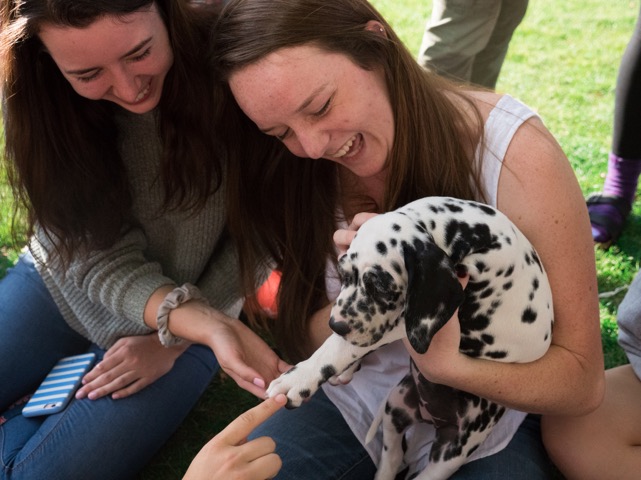Gratitude: A Building Block of Resilience
Nicola Mannetter, Center for Cura Personalis
As we head into the second half of fall semester, many of our students are beginning to feel worried, anxious and stressed. It’s likely this time of year when students begin to realize how much classwork remains in just a few short weeks, clubs and organizations are in full programming mode with various events and obligations, and the weather begins to turn colder and days are shorter. Add in pressure to attend social events and keep in touch with friends and family back home and it’s the perfect recipe for our students to feel overwhelmed.
In the Center for Cura Personalis, we’ve spent a lot of time helping students to build the skills of resiliency in an effort to help them grow through their obstacles and bounce back to a better place of wellness. We also know that one of the building blocks of resilience is gratitude. Gratitude is noticing, reflecting and acting on the moments, people, places and things we are thankful for in our lives. It can be something as simple as thinking about a song that makes you happy or writing a note of thanks to a friend to creating a gratitude challenge for your family or group of friends to get everyone involved. Gratitude can be practiced anywhere, any time and by any person – and is beneficial to all of us!
Gratitude increases the number of positive thoughts and feelings we have in any given day and also enforces our connections to others – these are both vital aspects to building resilience in our students. Studies have shown that the more you express thanks, the happier you are as a person and that gratitude even blocks toxic, negative emotions. Researchers studying gratitude have found that people who practice it consistently report stronger immune systems, longer and better sleep, more optimism, joy and pleasure and reduced feelings of being lonely or isolated, among other benefits (Source: http://greatergood.berkeley.edu/article/item/why_gratitude_is_good). In addition, practicing daily gratitude can help improve someone else’s day, too, when it is done with a note or kind word to another.
If your student is struggling with worry and stress, encourage them to spend a few minutes every day counting life’s little blessings. Keep a gratitude journal in which you list three things you are grateful for every morning. Keep notecards by your bed and write a note of thanks to one person in your life each day for a week. Put a quarter in a jar each time you are grateful for something in a month, then use that change to take a good friend or colleague out for lunch. Practice the daily Examen in which you review your day and identify moments of gratitude.
With the Thanksgiving holiday approaching, we are reminded, even more, to be thankful for the good things in our lives, both small and big. We are also presented with a great opportunity to practice gratitude as a family or group of friends. Pinterest is a great place to find gratitude challenges and ideas for making intentional choices to identify moments of gratitude in your life. You can also read more about the science behind gratitude and find additional ideas for practice here: http://www.happify.com/hd/the-science-behind-gratitude/


Kelley Holmes
I will be sharing this with my high school junior and my friends whose kids aren’t lucky enough to be part of the Gonzaga Community. Thank you!